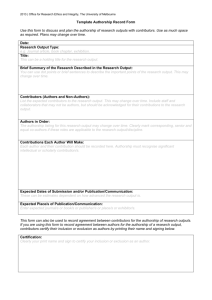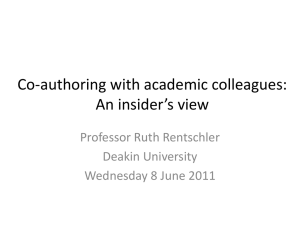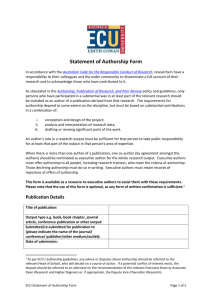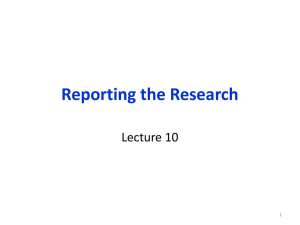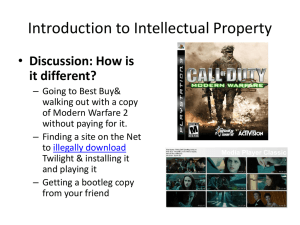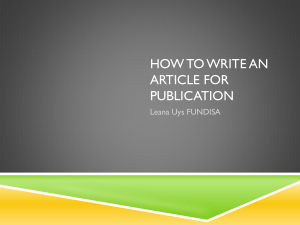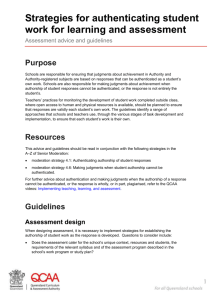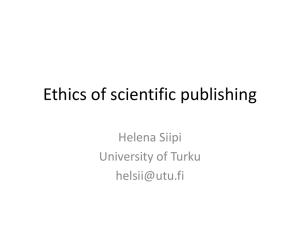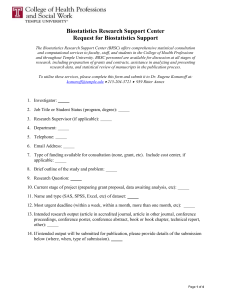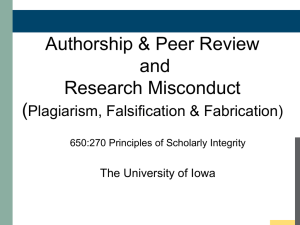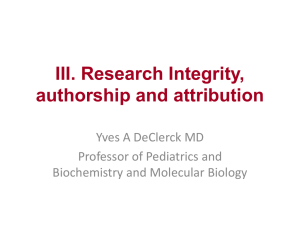Who is an Author? - University of Sheffield
advertisement
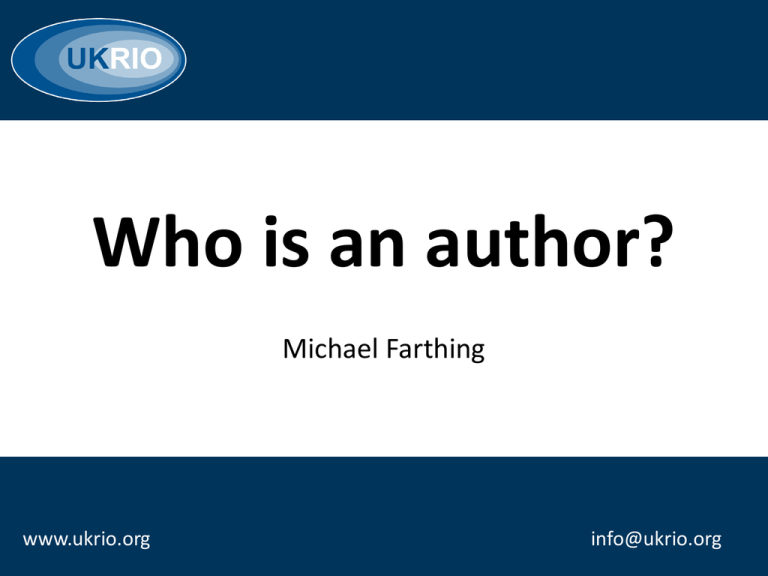
Who is an author? Michael Farthing www.ukrio.org info@ukrio.org Shared values • Honesty – conveying information truthfully and honoring commitments • Accuracy – reporting findings precisely and taking care to avoid errors • Efficiency – using resources wisely and avoiding waste • Objectivity–letting avoiding improper bias the facts speak for themselves and Who is an author? Responsible authorship? • How to decide? • Who decides? • When is the decision made? • Implications? Authorship Authorship credit should be based only on substantial contributions to all of the following: • Conception and design or acquisition of data or analysis and interpretation of data; and to • Drafting the article or revising it critically for important intellectual content; and • Final approval of the version to be published International Committee of Medical Journal Editors. Uniform requirements for manuscripts submitted to biomedical journals. Ann Intern Med 1997; 126: 36-47 Authorship • Participation solely in the acquisition of funding or the collection of data does not justify authorship • General supervision of the research group is also not sufficient for authorship Authorship- ‘In an ideal world’ • Authors should provide a description of what each contributed • Editors should publish that information • All others should be named in the acknowledgments Authorship Responsibilities of authors • Agree study design • Agree authorship • Ethical considerations • Maintain accurate and auditable records Authorship Corresponding or primary author assumes responsibility for: • Accuracy of the data • The names listed as authors • Approval of the final draft by all • Handling all correspondence and enquiries Authorship Authorship……….. or ‘contributorship’ ? Publication ethics: The interested parties Author Reviewer Editor Interested parties Pharma 3rd party Author Pharma 3rd Party Reviewer Pharma 3rd party Pharma 3rd party Editor Publisher Owner When Authorship goes wrong UKRIO cases 2007-11 % Authorship Authors’ misdemeanours: • Honorary (‘Gift’) authorship • Dual (multiple) submission • Failure to disclose conflicts of interest • ‘Salami slicing’ or ‘Salami publication’ • Redundant (duplicate) publication Who is an author? Other kinds of authors! • ‘Gift’ authors • ‘Ghost’ (professional) authors Are they OK? What are the dangers? Are ‘Ghost authors’ OK? • Industry initiated trials • 1994-5 • n = 44 • Copenhagen, Fredericksberg • Compared trial protocols with authors of publication • 33 of 44 (75%) ‘Ghosted’ Plos Medicine 2007;4:e19 Does funding source influence outcomes? • Systematic review of 30 studies • 13 /16 funded by the industry were favourable • Industry studies 4 times likely to be positive • 5 examined economics – all positive Lexchin et al, BMJ 2003; 326: 1167 Bias in meta analyses • Comparison of Cochrane reviews and industry supported/other reviews of the same pair of drugs • n = 24 • Cochrane higher quality and more likely to consider bias (p = 0.02) • Non-Cochrane more likely to recommend the experimental drug (p = 0.02) Jorgensen et al, BMJ 2006; 333: 782 Are ‘Ghost Authors’ OK? Authorship Case discussion Case study 1 A case from GUT • Fabrication /falsification ? • ‘Gift’ authorship • Forgery and fraud Case study 2 • Two researchers in adjacent labs are asked by their supervisor to plan a joint study • Each researcher has a different but complimentary technique to bring to the study • The work progresses rapidly and within 4 months they have sufficient data to present at a conference and to write up as a full paper. • The researchers ask for a meeting with the supervisor as they cannot agree who should give the conference presentation…… • And who should write the paper Case study 2 • Is this a reasonable request? • What is the problem? • How could it have been prevented? • Who is at fault? • How should it be resolved? Case study 3 • You are approached by Dr Jones, a researcher at your university. He states that he was surprised and very upset to learn recently that a book he had written jointly with a colleague, Dr Smith, is to be published with Dr Smith as the sole author. Dr Jones’ role in the research and the book will be acknowledged in the list of contributors to the project, nothing more. • The book is based on research which was conducted by Dr Jones and Dr Smith under the auspices of your university. A number of articles relating to the research have previously been published in peer reviewed journals. Case study 3 • Dr Jones states that he and Dr Smith had previously agreed that the book was a joint work and that they would each receive co-authorship. He does not have any written record of this agreement or any discussions regarding authorship. • Dr Jones tells you that he has spoken to Dr Smith in an attempt to reach some sort of agreement on the matter but was unsuccessful. He states that he has also spoken to the publishers of the book. Their response was that they had received reassurances from Dr Smith which they accept and they have no plans to change the attribution of authorship. Case study 3 • Prior to this dispute, Dr Jones believed that he had a good working relationship with Dr Smith. As well as seeking advice on how to address the issue of authorship, he is also concerned how his career might be affected by the dispute with Dr Smith. • How would you respond to Dr Jones? • What further information might you seek? • How might the situation be resolved?
